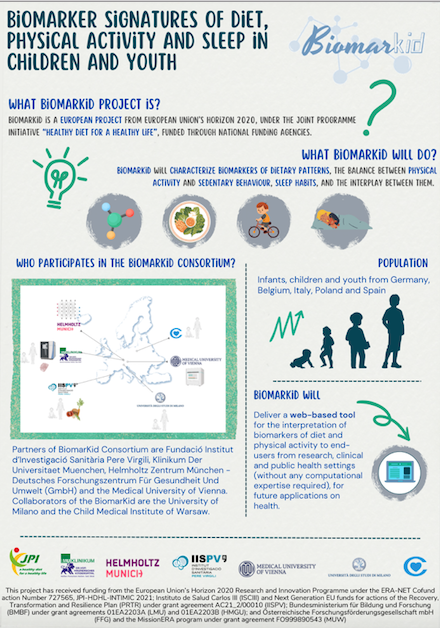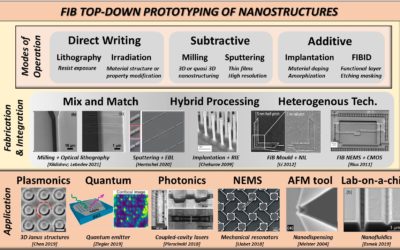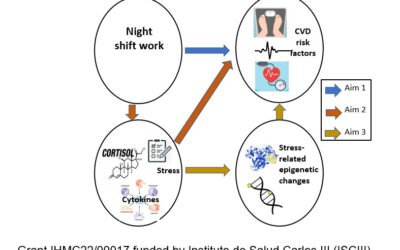Nom i cognoms / Name and surname
Veronica Luque Moreno
Afiliació / Affiliation
Paediatrics, Nutrition and Development Research Unit, Universitat Rovira i Virgili, IISPV, Reus, Spain.
Programa de finançament europeu en que s’enmarca aquest projecte? / European funding programme in which this project is being carried out?
EU support (FP7, H2020, etc.) other than MSCA
Títol del projecte / Project title
Biomarker signatures of diet, physical activity and sleep in children and youth
Número del projecte / Project number
This project has received funding from the European Union’s Horizon 2020 Research and Innovation programme under the ERA-NET Cofund action Number 727565, JPI-HDHL-INTIMIC 2021; Instituto de Salud Carlos III (ISCIII) and Next Generation EU funds for actions of the Recovery, Transformation and Resilience Plan (PRTR) under grant agreement AC21_2/00010 (IISPV); Bundesministerium für Bildung und Forschung (BMBF) under grant agreements 01EA2203A (LMU) and 01EA2203B (HMGU); and Österreichische Forschungsförderungsgesellschaft mbH (FFG) and the MissionERA program under grant agreement FO999890543 (MUW).
Breu explicació del projecte / Brief explanation of your project
What is already known?
Biomarkers have been established that reflect the intake of specific foods. However, foods are not consumed in isolation but as part of a complex diet. Therefore, the interaction of
foods, dietary habits and dietary patterns need to be considered to predict biological and health outcomes. Moreover, energy balance, activity and circadian patterns interact with the systemic effects of dietary components, and hence the effects of dietary intake are related to physical activity, sedentary and sleep behaviour. There is an unmet need to characterise objective quantitative single and combined biomarkers to assess diet, physical activity, sedentary behaviour and sleep. Most promising are biomarkers that evaluate diet and behaviour in interaction with the body’s metabolic needs, including intermediate and end products of metabolism that can now be measured with sensitive and precise high performance metabolomics methodology and be analysed with cutting edge bioinformatics tools.
What will BiomarKid do?
BiomarKid will characterize biomarkers that can identify adherence to dietary patterns,
patterns of physical and sedentary activity, and sleep, and the interaction between them, from birth to young adulthood. BiomarKid will capitalize two longitudinal deeply phenotyped cohort studies: CHOP and TOMI (0 to 18y) with 3300 participants. They provide an extremely rich database on dietary intake (based on repeated 3-day dietary records and food frequency questionnaires), objective measures of physical activity, sedentarism and sleep (by computerized accelerometry), biosamples that are already analyzed in part and will be available for further analyses. BiomarKid will use state of the art techniques to determine
dietary patterns, quantify biomarkers (metabolomics, proteomics) and sophisticated computer-based techniques to maximize the understanding of the data (machine learning and artificial intelligence). The consortium holds the outstanding multidisciplinary expertise, capabilities and infrastructure to conduct the project.
What will BiomarKid add?
• Appropriate characterization of biomarkers of comprehensive dietary patterns, the balance between physical activity and sedentary behaviour, sleep habits, and the interplay
between them.
• BiomarKid will deliver a web-based tool for interpretation of biomarkers of diet and
physical activity to end-users from research, clinical and public health settings (computational expertise not required), for future applications on health.
Enllaç a la pàgina web del projecte / Link to your project website
–
Repte en que s’emmarca aquest projecte / Challenge within the framework of this project
Does not apply

















